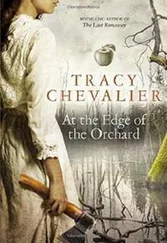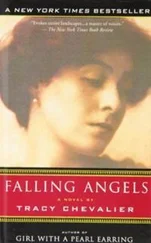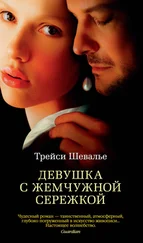‘Yes, but he was born in Montbéliard. I checked, and guess where that is? Thirty miles from Moutier! Just inside the French border. His parents could easily have moved from Moutier to Montbéliard.’
‘There was no information about his family?’
‘No, there wasn't much about him at the museum, just that he was born in Montbéliard in 1590, spent some time in Rome, then came to Toulouse and died in 1639. That's all they know.’
Jean-Paul tapped the postcard against his knuckles. ‘If they know his birth date they will know his parents’ names. Birth and baptism records always list the parents.’
I gripped the table. Rick's response was so different from this, I thought.
‘I will look for information about him for you.’ He stood up and handed me the postcard.
‘No, I don't want you to,’ I said loudly. Several people looked up and the other librarian frowned at us.
Jean-Paul raised his eyebrows.
‘Monsieur, I will do it. I will find out about him.’
‘I see. Very well, Madame.’ He bowed slightly and walked away, leaving me feeling shaky and deflated. ‘Damn him,’ I muttered, staring at the Virgin. ‘Damn him!’
Jean-Paul's scepticism affected me more than I wanted to admit. When I discovered the painter it didn't occur to me to find out more about him. I knew who he was; my gut feeling was all the proof I needed. Names and dates and places would make no difference to that certainty. Or so I thought.
But it only takes one comment to cast doubt. For a couple of days I tried to ignore what he had said, but the next time I went into Toulouse I took the postcard with me and after my lesson headed for the university library. I'd been there before to use their medical books but I'd never ventured into the arts section. It was packed with students studying for exams, writing papers, talking in stairwells in excited tones.
It took longer than I'd expected to find out anything about Nicolas Tournier. He was part of a group of painters called the Caravagesques, Frenchmen who studied in Rome in the early seventeenth century, copying Caravaggio's use of strong light and shadow. These painters often didn't sign their works, and there were long-running debates about who had painted what. Tournier was mentioned briefly here and there. He wasn't famous, though two of his paintings were in the Louvre. The little information I found was different from what I'd read at the museum: the earliest source listed him as Robert Tournier, born in Toulouse in 1604, died around 1670. I was only sure it was the same painter because I recognized the paintings. Other sources gave different dates again and corrected his name to Nicolas.
Finally I pinpointed three books that were the most up-to-date sources. When I looked for them on the shelves they were all missing. I talked to a hassled student behind the information desk who probably had his own exams to study for; he looked up the books on his computer and confirmed that they'd all been taken out.
‘It is very busy now, as you can see,’ he said. ‘Maybe someone is using them to research a paper.’
‘Can you find out who has them?’
He glanced at the screen. ‘Another library has requested them.’
‘In Lisle-sur-Tarn?’
‘Yes.’ He looked surprised, even more so when I muttered, ‘Bastard! Not you, I mean. Thanks very much.’
I should have known Jean-Paul wouldn't sit on his hands and let me do it myself. He was too intrusive to stay away, too intent on proving his own theories. The question was whether or not I was willing to chase after him to find out more.
In the end I didn't have to decide. Up the street from the Lisle train station I ran into Jean-Paul on his way home from work. He nodded and said ‘ Bonsoir ,’ and before I could think I blurted out, ‘You've got the books I've been looking for all afternoon. Why did you do that? I asked you not to look into him for me but you're doing it anyway!’
He looked almost bored. ‘Who said I do this research for you, Ella Tournier? I was curious about him, so I look for myself. If you want the books you can see them at the library tomorrow.’
I leaned against a wall and crossed my arms. ‘All right, all right. You've won. Just tell me what you found out. Hurry up and get it over with.’
‘You are sure you don't want to see the books yourself?’
‘Just tell me.’
He lit a cigarette, inhaled and blew out toward his feet. ‘OK. Maybe you find out today that there is not so much information on Nicolas Tournier for a long time. But in 1951 was found a record of his baptism, in July 1590 in a Protestant church in Montbéliard. His father was André Tournier, who was a painter from Besançon – that is not so far from Montbéliard. His grandfather was called Claude Tournier. The father, André Tournier, came to Montbéliard in 1572 because of religious troubles – maybe because of the Massacre of Saint Bartholomew. Your painter, Nicolas, was one of several children. There are mentions of him in Rome between 1619 and 1626. Then a mention of him in Carcassonne in 1627, and in Toulouse in 1632. For a long time they thought he died later in the seventeenth century, after 1657. But in 1974 was discovered his will with the date 30 December 1638. He died probably soon after.’
I studied the ground and was quiet for so long that Jean-Paul grew restless and flicked his cigarette into the street.
Finally I spoke. ‘Tell me, were baptisms back then performed right after the birth?’
‘Usually, yes. Not always.’
‘So it could be put off for some reason, right? The date of baptism doesn't necessarily indicate the date of birth. Nicolas Tournier could have been a month or two years or ten years old when he was baptized for all we know. Maybe he was even an adult!’
‘That is not likely.’
‘No, but it's possible . What I'm saying is that the source doesn't tell us exactly. And his will has that date you mentioned, but that doesn't mean we know when he died. We don't know, do we? Maybe he died ten years after making it.’
‘Ella, he was ill, he made his will, he died. That is what usually happens.’
‘Yes, but we don't know for sure . We don't know exactly when he was born or when he died. These records don't prove anything. All the basic details about him are still open to question.’ I paused to suppress the rising hysteria in my voice.
He leaned against the wall and folded his arms. ‘You just don't want to hear that this painter's father was André Tournier and not any of your ancestors. No Etienne or Jean. But he was not from the Cévennes or from Moutier. He is not your relative.’
‘Look at it this way,’ I continued more calmly. ‘Until recently – until the 1950s – they didn't know anything about him. They got all his vital statistics wrong except for his last name and the city he died in. Everything else was wrong: his first name, his birth and death dates, where he was born, some of his paintings which turned out to be by other painters. And all of this wrong information was published ; I saw it at the library. If I hadn't found out there were more recent sources I'd have all the wrong information about him. I'd even be calling him by the wrong name! Even now art historians are arguing over which paintings are his. If they can't get that basic information right – if it's all got to be based on speculation, where a baptism equals birth and a will equals death – well, that's just shifting evidence. It's not concrete, so why should I believe it? What does seem concrete to me is that his last name is my last name, that he worked only thirty miles from where I live, that he painted the same blue I dream about all the time. That's concrete.’
Читать дальше
Конец ознакомительного отрывка
Купить книгу
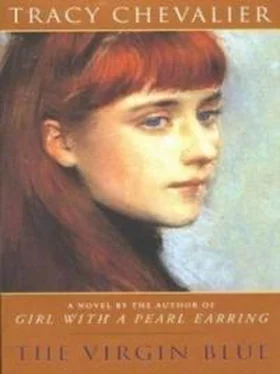
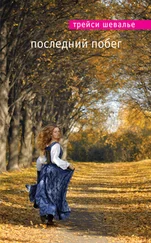
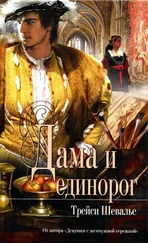
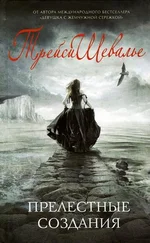
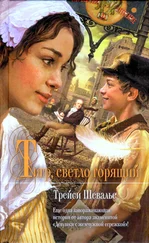
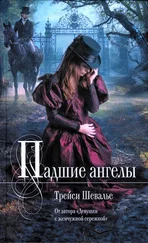
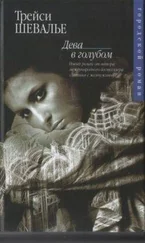
![Трейси Шевалье - Тонкая нить [Литрес]](/books/386177/trejsi-shevale-tonkaya-nit-litres-thumb.webp)
